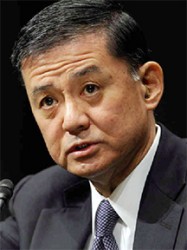WASHINGTON, (Reuters) – Embattled Veterans Affairs Secretary Eric Shinseki resigned yesterday following a meeting with President Barack Obama that came amid a firestorm of outrage over delays in medical care for U.S. veterans.

Shortly after the private White House session, Obama announced to reporters that “with considerable regret, I accepted” Shinseki’s resignation. The move came after a growing number of Democrats and Republicans in Congress, as well as some veterans’ groups, had called for his removal.
Obama said he accepted the resignation of the soft-spoken, 71-year-old retired Army general after being briefed on the initial findings of the investigation into abuses that were initially found in Phoenix but later identified at other facilities across the country.
Obama praised Shinseki’s military career and accomplishments at the VA, including tackling issues like post-traumatic stress syndrome and homelessness among veterans.
“Ric’s commitment to our veterans is unquestioned. His service to our country is exemplary,” Obama said. “He has worked hard to investigate and identify the problems with access to care. But, as he told me this morning, the VA needs new leadership to address them.” The rising number of veterans with combat-related injuries from the Iraq and Afghanistan wars has placed greater demands on the VA.
Members of Congress immediately applauded the move as a step toward restoring confidence in the embattled agency that provides healthcare and other benefits to veterans.
“The denial of care to our veterans is a national disgrace and it’s fitting that the person who oversees the Department of Veterans Affairs has accepted responsibility for this growing scandal and resigned,” said Senate Republican leader Mitch McConnell of Kentucky. Representative Peter Welch, a Vermont Democrat, said: “Obviously General Shinseki came to the conclusion that he’d lost the confidence, at least, of Congress. He stepped aside so the debate could be about fixing the VA as opposed to his status.”
The scandal over long delays, which were being concealed by VA officials, in providing medical care to veterans comes just five months before congressional elections in which all 435 House of Representatives seats are up for grabs, along with one-third of the 100-member Senate.




